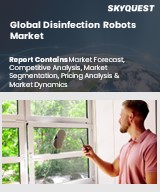
Product ID: SQMIG45M2013
Report ID:
SQMIG45M2013 |
Region:
Global |
Published Date: February, 2024
Pages:
157
|
Tables:
93 |
Figures:
76
We respect your privacy rights and safeguard your personal information. We prevent the disclosure of personal information to third parties.
Disinfection Robots Market size was valued at USD 538.126 million in 2019 and is poised to grow from USD 714.78 million in 2023 to USD 7697.57 million by 2031, growing at a CAGR of 32.84% in the forecast period (2024-2031).

Product ID: SQMIG45M2013